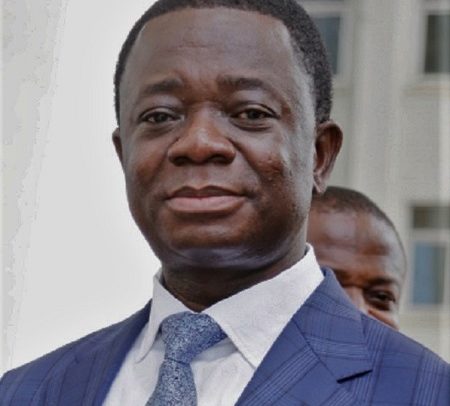Dr Stephen Opuni
An Accra High Court yesterday heard how former Chief Executive Officer of Ghana Cocoa Board (COCOBOD) spent $64.5 million on the controversial Lithovit Liquid Fertilizer which was never tested.
The amount represents 2.4 million litres of the liquid fertilizer COCOBOD purchased from Agricult Ghana Limited between 2014 and 2016.
Detective Chief Inspector Thomas Prempeh Mercer revealed this when he appeared before the court as the Seventh prosecution witness in the trial of Dr. Opuni and Seidu Agongo who are before the court for causing over GH₵217 million financial loss to the state.
The two are facing a total of 27 charges, including defrauding by false pretense, willfully causing financial loss to the state, money laundering, corruption by a public officer and contravention of the Public Procurement Act.
Led in his evidence in chief by Evelyn Keelson, a Chief State Attorney, Detective Chief Inspector Mercer told the court about how issues concerning the procurement of Lithovit Fertilizer by COCOBOD were referred to the Financial Forensics Unit (FFU) of the Criminal Investigations Department of the Ghana Police Service.
He told the court about how Dr. Opuni who was appointed as CEO of COCOBOD in 2013 and upon taking office in 2014 reduced the testing period for agrochemicals used on cocoa by the Cocoa Research Institute of Ghana (CRIG).
The witness told the court that investigations by the FFU revealed that in 2013, Agricult Ghana Limited through its chief executive, Seidu Agongo, introduced Lithovit foliar fertilizer which was in powdered form together with its Material Safety Data Sheet (MSDS) to COCOBOD.
He said on May 15, 2013, COCOBOD forwarded the fertilizer together with its MSDS to CRIG for testing.
The court heard that during discussions with scientists at CRIG, investigations revealed that agrochemicals that were sent to CRIG for testing must go through a minimum testing period of two years and a maximum of three years.
Detective Chief Inspector Mercer told the court that Dr. Opuni upon assuming office, had a meeting in his office at Cocoa House in Accra with some senior scientists at CRIG where he directed the scientist present to shorten the test period of agrochemicals and fertilizers with reasons that suppliers took undue advantage of the monopoly they enjoyed and charged high prices on their products.
It was against this backdrop that Lithovit fertilizer after its laboratory testing was applied to two months old cocoa seedlings for only six months and a report issued for it to be applied on mature cocoa plants.
The witness told the court that although CRIG tested a powdered Lithovit foliar fertilizer, Agricult Ghana Limited between 2014 and 2016 “supplied quantities of Lithovit liquid fertilizer to COCOBOD for use on cocoa which was not tested because the Lithovit folia fertilizer sent to CRIG for testing was powder.”
He said in 2014, COCOBOD through Dr. Opuni signed a $19.25 million contract with Agricult Ghana Limited for the supply of 700,000 litres of Lithovit liquid fertilizer for the 2013/2014 cocoa season which was supplied and paid for.
“In 2014/15 again, COCOBOD through Dr. Opuni procured from Mr. Agongo and Agricult Ghana Limited a million liters of Lithovit liquid fertilizer to the tune of $26,000,000. My Lord, in 2015/2016 cocoa season, Dr. Opuni procured from Agricult Ghana Limited, 700,000 liters of Lithovit liquid fertilizer amounting to $19,250,000,” Detective Chief Inspector Mercer told the court.
He added that “In 2016/2017, Dr. Opuni wrote to Agricult Ghana Limited for the supply of another one million liters of Lithovit liquid fertilizer. However that was not supplied because the contract was abrogated when investigations commenced and it revealed that the Lithovit liquid fertilizer supplied to COCOBOD by Mr. Agongo and Agricult Ghana Limited from 2014 to 2016 was not tested because the only Lithovit foliar fertilizer sent to CRIG for testing by Mr. Agongo and Agricult Ghana Ltd. on May 15, 2013 remained the only Lithovit sent to CRIG for testing which was in powdered form.”
Hearing continues on January 18, 2021.
BY Gibril Abdul Razak


